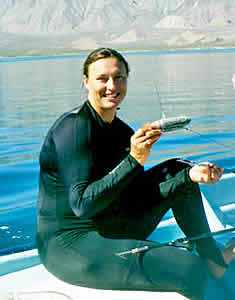
Dr. Rachel T. Graham of the Wildlife Conservation Society of Belize demonstrates how a 'Spot' tag works. Photo by: Patty Civalleri
Non-profit organization Iemanya Oceanica today announced the addition of 3 newly tagged whale sharks to their family of sharks for research and conservation. The 3 new sharks are available to the public for adoption online and represent the need for urgent conservation of sharks. The organization's Adopt A Shark Program now has a total of 10 sharks that, with the aide of the tags, will help provide data to assist in conservation of these mysterious and misunderstood creatures.
Iemanya (pronounced ya-MAHN-ja) Oceanica's research team recently departed the L.A. area on a 5-day tagging expedition in Bahia de Los Angeles in Mexico. Accompanied by 2 film crews and 20 members of the Southern California public, Iemanya was successful at tagging 3 whale sharks. These animals feed on plankton in the surface waters which makes them particularly vulnerable to boat collisions and overfishing.
The tags were attached by Dr. Rachel T. Graham of the Wildlife Conservation Society of Belize. After photo identifying and determining the sex of the sharks, Dr. Graham and the team attached the tags to the dorsal fin with a simple device. This device or 'tag' captures large amounts of data and transmits it via satellite back home, where it is then translated and shared with the online community, making shark research and science accessible to children and ocean enthusiasts.
The type of data being gathered includes air & water temperatures, diving patterns, day-night-and-seasonal movement, calving and feeding habits. This information aids Iemanya in more efficiently advocating for their conservation. The tags serve a 2nd benefit to the organization. "People can now go online and adopt a shark as an educational gift," said Laleh Mohajerani, Iemanya's executive director. "Then every day they can track the movement of their shark. This is a wonderful form of interactive education that everyone can participate in and learn from," she added.
"We opened up 20 seats on this expedition to the public," said Patty Civalleri, Iemanya board member, "and because of the assistance from the media, we were able to fill those seats quickly with volunteers who came to us with various levels of water skills and a general knowledge of nature and the ocean. We couldn't have asked for a better group."
Additional details can be found by visiting www.Adoptashark.com and www.OurOceanOurFuture.org.
